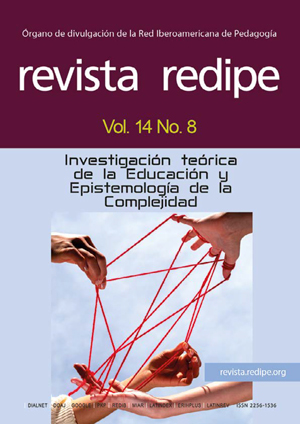Theoretical educational research and its problem-solving capabilities
Main Article Content
Keywords
Theory of Education, Signification of Knowledge of Education, Theoretical Research Methodology in Education, General and Applied Pedagogy, Epistemology of Education, Mesoaxiological Pedagogy, Knowledge of Education
Abstract
Educational theory is knowledge of education; there is a relationship between theory and education through knowledge of education. Each way of understanding educational knowledge allows us to understand the meaning of theory in relation to “education.” The objective of this article is to analyze the semantic plurality of the concept of “theory” in relation to “education” within the framework of interpreting how educational knowledge is understood and to assess the capacity to solve education problems, according to the adopted pedagogical mentality.
The capacity to solve educational problems of the knowledge of education is a principle of research methodology, which is known as signification. Signification (sense of) as a principle of methodology. It is associated with the validity of educational knowledge, and it is defined as the capacity to solve education problems attributed to the knowledge of education in each field, from the perspective of the theory-practice relationship for educational activity. Signification as a principle of methodology has become an axis of theoretic pedagogical research.
Our conclusion is that asking what knowledge of education is needed requires a broad answer that is not restricted to the knowledge of education provided by a particular current of thought. The different ways of understanding educational knowledge have generated a necessary diversity of theoretical knowledge of education, depending on the type of problems that are going to be analyzed.
Depending on the type of problems we are addressing, we will need different and distinct specific knowledge to understand and solve them (philosophies of education, philosophy of education, interpretive theories of education from other sciences, practical theories, substantive theories, and research on educational theory as a discipline, also called general pedagogy research). And as for knowledge of education, not every way of procedure has the same capacity to solve educational problems.
References
Biesta, G.; Allan, J. y Edwards, R. (Eds.) (2014). Making a Difference in Theory: The Theory Question in Education and the Education Question in Theory. Londres/Nueva York: Routledge.
Boavida, J. y García del Dujo, A. (2007). Teoría da Educaçao. Contributos Ibéricos. Coimbra: Imprenta da Universidade de Coimbra.
Bunge, M. (1975). Teoría y realidad. Barcelona: Ariel, 2ª ed.
Bunge, M. (1985). Treatise on Basic Philosophy. Vol. 7. Part. II. Hollan: Reidel, Dordrecht.
Carr, W. (2006). Education without Theory. British Journal of Educational Studies, 534 (2), 136-159.
Carr, D. (2014). Diverse Senses and Six Conceptions of Education. Revista española de pedagogía, 72 (258), 219-230.
Carr, W. y Kemmis, S. (1988). Teoría crítica de la enseñanza. La investigación-acción en la formación del profesorado. Barcelona: Martínez Roca.
Castillejo, J. L; Vázquez, G.; Colom, A. J., Sarramona, J. (1994). Teoría de la educación. Madrid: Taurus.
Colom, A, J. (2018). Apuntes sobre la institucionalización de la Pedagogía en España, en Grupo SI(e)TE. Educación, La Pedagogía, hoy. Santiago de Compostela: Andavira, cap. 1.
Colom, T., Sarramona, J. y Vázquez, G. (2023). Reflexión y práctica pedagógica. Barcelona: Horsori.
Dewey, J. (1929). La ciencia de la educación. Buenos Aires: Losada.
Dewey, J. (1971). Democracia y educación. Buenos Aires: Losada, 7ª ed.
Dewey, J. (1998). Cómo pensamos. Nueva exposición de la relación entre pensamiento reflexivo y proceso educativo. Barcelona: Paidós.
Dilthey, W. (1965). Fundamentos de un sistema de pedagogía. Buenos Aires: Losada, 8ª ed. (fecha de edición original alemana, 1884).
Diz López, M.ª J. y Gutiérrez, M.ª C. (2024). Educación de las emociones y pedagogía mesoaxiólógica para la inclusión. Una experiencia de Aprendizaje-Servicio (ApS) USC-Navalón, en J. M. Touriñán López y L. Touriñán Morandeira (Coords.), Pedagogía y educación, en perspectiva mesoaxiológica. Cuestiones aplicadas. Colección internacional de pedagogía mesoaxiológica patrocinada por Redipe (Libro 18). Santiago de Compostela-Cali: Jmtl-Redipe-Capítulo de Estados Unidos, pp. 339-373.
Escámez, J. (2007). Las aportaciones de la Teoría a la Educación. Revista Española de Pedagogía, 65 (237), 217-235.
Fullat, O. (1979). Filosofías de la educación. Barcelona: CEAC. (Edición ampliada de 1992, Filosofías de la Educación. Paideia. Barcelona: CEAC).
García Aretio, L. (1989). La educación. Teorías y conceptos. Madrid: Paraninfo.
García Aretio, L.; Ruiz Corbella, M. y García Blanco, M. (2009). Claves para la educación. Actores, agentes y escenarios en la sociedad actual. Madrid: Narcea.
García Carrasco, J. (Coord.) (1984). Teoría de la educación, en A. Escolano (Ed.), Diccionario de Ciencias de la Educación. Madrid: Anaya.
García del Dujo, A (2006). (Coord.). Teoria da educaçao. Modos de facer e pensar hoje. Revista portuguesa de pedagogía, (40), 2 Vols. Universidade de Coimbra.
Gargallo, B. (2002). La Teoría de la Educación. Objeto, enfoques y contenidos. Teoría de la Educación. Revista Interuniversitaria, (14), 19-46.
Gil Cantero, F. (2011). “Educación con teoría”. Revisión pedagógica de las relaciones entre la teoría y la práctica educativa. Teoría de la educación. Revista Interuniversitaria, 23 (1), 19-43.
González Álvarez, A. (1977). Filosofía de la educación. Buenos Aires: Troquel.



